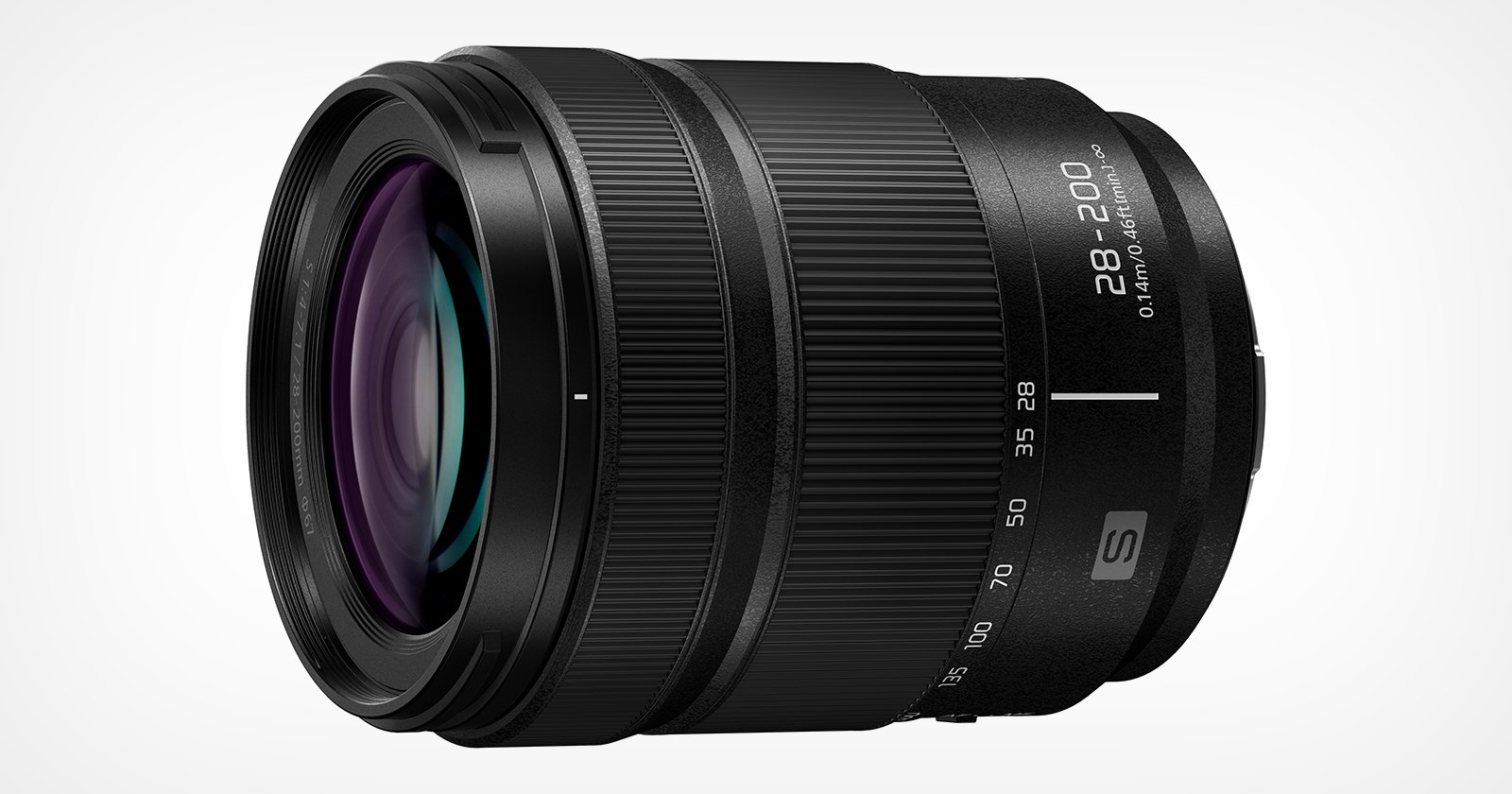
[ad_1]
Not even two months after announcing the remarkably compact Lumix S 100mm f/2.8 Macro lens, Panasonic is back with another lens for its full-frame cameras. The Lumix S 28-200mm f/4-7.1 Macro O.I.S. all-in-one zoom lens may not move the needle much for pros, but it fills an essential role in Panasonic’s L-mount lens lineup. The new lens marks Panasonic’s first wide-to-tele zoom for Lumix S Series cameras. For many photographers, especially novice shooters or those who don’t have a large budget to work with, an all-in-one zoom is a desirable option. It can do almost everything, even if it often doesn’t excel at any particular focal length — a “jack-of-all-trades, master of none” situation. However, Panasonic promises that unlike some competing all-in-one lenses, its new 28-200mm zoom doesn’t sacrifice much imaging performance. It promises “outstanding imaging performance” and “stunning bokeh.” These are ambitious claims and ones PetaPixel is keen to test with an eventual hands-on review. For the time being, taking Panasonic’s assertions at face value, the new 28-200mm lens should be especially well-suited to travel photography, landscapes, and even portraits. The new Lumix S 28-200mm f/4-7.1 lens on the Panasonic Lumix S5 II. The aperture, which ranges from f/4 at the wide end and narrows to f/7.1 as the user zooms, may not seem quick enough for portraiture, but the lens can focus very closely, which helps create nice bokeh and background separation when the situation allows. The lens doesn’t include “Macro” in its model name for nothing. It can focus as close as 0.14 meters (5.5 inches), enabling a maximum shooting magnification of 0.5x, which is half-size macro.
For photographers and videographers seeking an all-in-one zoom to add to their kit, they often prioritize a compact and lightweight lens. Borrowing a page out of the 100mm f/2.8 Macro’s book, which is the smallest 100mm f/2.8 macro lens for full-frame cameras, the 28-200mm boasts the world’s smallest and lightest design for a long zoom lens. As always, that sort of claim comes with a footnote. In this case, it’s that a “long zoom lens” is an AF-compatible full-frame mirrorless lens with an optical zoom of seven times or more. It’s a bit of a mouthful, but a noteworthy accomplishment nonetheless. The lens is approximately 93 millimeters (3.7 inches) long at its smallest and weighs 413 grams (0.9 pounds). The lens extends slightly when zooming, but only by around 50%. The lens uses 67mm filters; its maximum diameter is 77.3 millimeters (three inches). It is also dust, splash, and freeze-resistant. While Panasonic is quick to note that it’s not a weather-proof lens, the company says the lens is built to withstand the weather and elements photographers may experience in the field. The lens has 17 optical elements arrayed across 13 groups. It features a single aspherical lens, four ED lenses, and a UHR element. It has a nine-bladed circular aperture diaphragm. Concerning the aperture, videographers may worry about aperture changes when zooming during recording disrupting the exposure. Panasonic uses micro-step aperture control in the lens to ensure that exposure changes smoothly.
Users can also swap between linear and nonlinear focus ring behavior, meaning that focus throws should be relatively straightforward. For gimbal users, the lens should balance nicely throughout the entire zoom range when set in the camera to 75mm. The lens also promises suppressed focus breathing, a trademark of Lumix S Series lenses. As for autofocus, the lens promises high-speed, silent autofocus. It also includes optical image stabilization (O.I.S.), which ensures shake compensation up to 6.5 stops when using Dual I.S. 2. The lens fills an interesting role within the L-Mount System at large. For full-frame lenses, the 28-200mm pairs nicely with Panasonic’s Lumix S 14-28mm f/4-5.6 Macro wide-angle zoom lens ($800) or the Sigma 16-28mm f/2.8 DG DN Contemporary ($900). As for alternatives that serve a similar all-in-one purpose as the new 28-200mm, the pickings are slim in L-Mount. There’s the Panasonic Lumix S 24-105mm f/4 Macro O.I.S., but at $1,300, it’s a fairly expensive alternative. It’s also larger and heavier while offering about half the maximum focal length. That’s it. The Tamron 28-200mm f/2.8-5.6 Di III RXD lens, which is an excellent full-frame all-in-one zoom, is only available for E-mount cameras. Sample Images
Pricing and Availability The Panasonic Lumix S 28-200mm f/4-7.1 Macro O.I.S. lens will be available through authorized retailers by the end of April for $900. Image credits: Panasonic
[ad_2]






